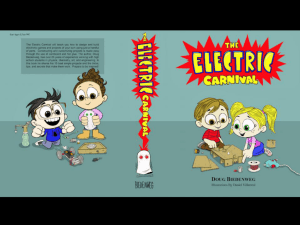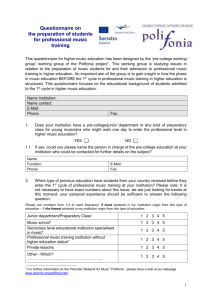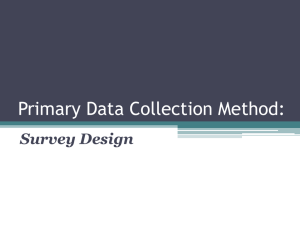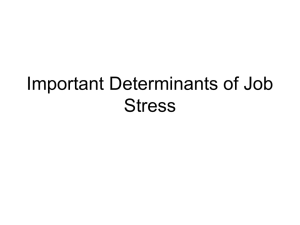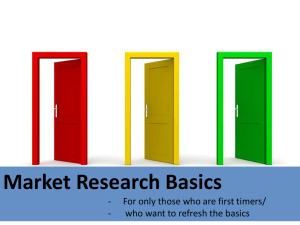Measures and techniques to improve the environmental
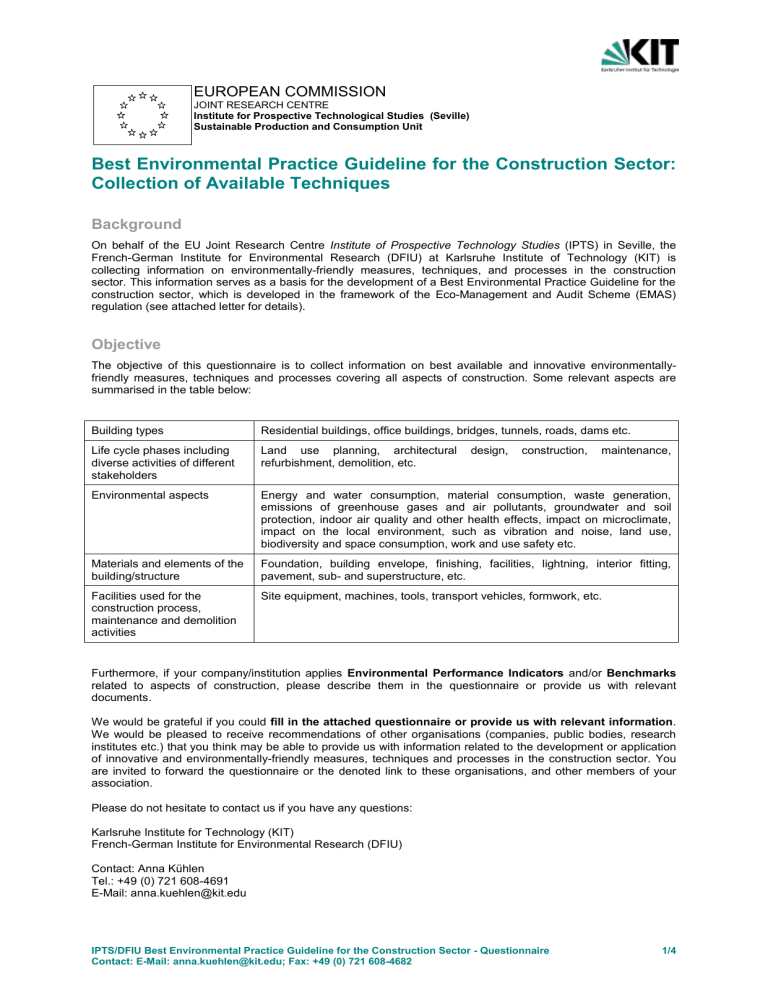
EUROPEAN COMMISSION
JOINT RESEARCH CENTRE
Institute for Prospective Technological Studies (Seville)
Sustainable Production and Consumption Unit
Best Environmental Practice Guideline for the Construction Sector:
Collection of Available Techniques
Background
On behalf of the EU Joint Research Centre Institute of Prospective Technology Studies (IPTS) in Seville, the
French-German Institute for Environmental Research (DFIU) at Karlsruhe Institute of Technology (KIT) is collecting information on environmentally-friendly measures, techniques, and processes in the construction sector. This information serves as a basis for the development of a Best Environmental Practice Guideline for the construction sector, which is developed in the framework of the Eco-Management and Audit Scheme (EMAS) regulation (see attached letter for details).
Objective
The objective of this questionnaire is to collect information on best available and innovative environmentallyfriendly measures, techniques and processes covering all aspects of construction. Some relevant aspects are summarised in the table below:
Building types Residential buildings, office buildings, bridges, tunnels, roads, dams etc.
Life cycle phases including diverse activities of different stakeholders
Environmental aspects
Land use planning, architectural design, construction, maintenance, refurbishment, demolition, etc.
Energy and water consumption, material consumption, waste generation, emissions of greenhouse gases and air pollutants, groundwater and soil protection, indoor air quality and other health effects, impact on microclimate, impact on the local environment, such as vibration and noise, land use, biodiversity and space consumption, work and use safety etc.
Foundation, building envelope, finishing, facilities, lightning, interior fitting, pavement, sub- and superstructure, etc.
Materials and elements of the building/structure
Facilities used for the construction process, maintenance and demolition activities
Site equipment, machines, tools, transport vehicles, formwork, etc.
Furthermore, if your company/institution applies Environmental Performance Indicators and/or Benchmarks related to aspects of construction, please describe them in the questionnaire or provide us with relevant documents.
We would be grateful if you could fill in the attached questionnaire or provide us with relevant information .
We would be pleased to receive recommendations of other organisations (companies, public bodies, research institutes etc.) that you think may be able to provide us with information related to the development or application of innovative and environmentally-friendly measures, techniques and processes in the construction sector. You are invited to forward the questionnaire or the denoted link to these organisations, and other members of your association.
Please do not hesitate to contact us if you have any questions:
Karlsruhe Institute for Technology (KIT)
French-German Institute for Environmental Research (DFIU)
Contact: Anna Kühlen
Tel.: +49 (0) 721 608-4691
E-Mail: anna.kuehlen@kit.edu
IPTS/DFIU Best Environmental Practice Guideline for the Construction Sector - Questionnaire
Contact: E-Mail: anna.kuehlen@kit.edu; Fax: +49 (0) 721 608-4682
1/4
Instructions for answering the questionnaire
For each measure, technique and process the following information should be provided:
1. A brief description
2. Environmental and health aspects
3. Operational data
4. Cross media effects (if applicable)
5. Applicability
6. Economics
7. Driving forces
8. Application example
9. Performance indicators / benchmarks
10. References
Use one form for each measure/technique/process (hence duplicate the form to describe more techniques)
Contact details
Name of contact person
Name of institution/enterprise
Address (street, postcode, city)
Telephone
Industry/enterprise description
IPTS/DFIU Best Environmental Practice Guideline for the Construction Sector - Questionnaire
Contact: E-Mail: anna.kuehlen@kit.edu; Fax: +49 (0) 721 608-4682
2/4
1. Description of measure/technique/process
Name of measure/technique/process
Description of measure/ technique/process
2. Description of environmental and health benefits/positive impacts (e.g. water savings (xx litres per year or xx % relative to common practice), reduction of CO
2
emissions (xx tons CO
2
per year or xx %)). If applicable, biodiversity should be considered as one environmental aspect as well.
3. Operational data of measure/technique/process (description of technical specifications)
4. Cross media effects (if applicable, additional environmental effects besides the major benefits/positive impacts, described in section 2, e.g. a slight increase in material consumption connected to the main benefit of emission reduction)
5. Applicability (limitations of the measure/technique/process to any local condition, activity, design concept, material etc.)
IPTS/DFIU Best Environmental Practice Guideline for the Construction Sector - Questionnaire
Contact: E-Mail: anna.kuehlen@kit.edu; Fax: +49 (0) 721 608-4682
3/4
6. Economics (investment, major costs, alternatively: cost drivers)
7. Driving forces for the implementation/realisation (e.g. legislation, financial)
8. Example of the application/realisation of the described measure/technique/process
9. Construction aspects related Environmental Performance Indicators and/or Benchmarks to measure the environmental performance of measures/techniques/processes (e.g. the thermal conductivity of installed heating systems, number of times a formwork is reusable)
10. References and link to further information
Please return the questionnaire by 10th May 2010 to:
E-Mail: anna.kuehlen@kit.edu
Fax: +49 (0) 721 608-4682
IPTS/DFIU Best Environmental Practice Guideline for the Construction Sector - Questionnaire
Contact: E-Mail: anna.kuehlen@kit.edu; Fax: +49 (0) 721 608-4682
4/4

